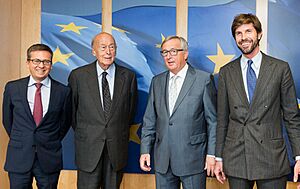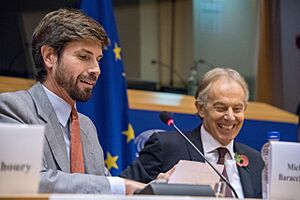Atomium – European Institute for Science, Media and Democracy facts for kids
Atomium European Institute for Science and Democracy (EISMD) is a group based in Brussels, Belgium, that works to solve big problems using science. It's an international non-profit organisation, which means its main goal is to help people, not to make money.
The institute brings together smart people from European universities, big companies, and governments. Together, they use scientific facts to give advice to leaders and help them make good decisions for everyone.
The organization was officially started in 2009 at the European Parliament. The launch was led by former French President Valéry Giscard d'Estaing and Michelangelo Baracchi Bonvicini.
Contents
History of the Institute
The idea for the institute began in 2006. From the start, it had support from over forty top European universities and businesses. Many important leaders also joined to help, including Valéry Giscard d'Estaing, former Prime Minister of the UK Tony Blair, and former President of the European Commission Jean-Claude Juncker.
A key moment happened on November 9, 2009. On this day, Giscard d'Estaing and Baracchi Bonvicini signed a document called the European Manifesto. This officially launched the institute's work.
Later, in 2012, the institute spoke up about the EU budget. They asked European leaders to spend more money on science research and new ideas. They believed this would help Europe grow and solve future challenges. Their message was published in major newspapers across Europe.
What is REIsearch?
REIsearch is a special project created by the institute. It was supported by the European Commission and companies like Nokia. The goal of REIsearch is to build a bridge between scientists and policymakers. Policymakers are the people in government who make rules and laws.
By connecting these two groups, REIsearch helps make sure that new laws are based on solid scientific facts. This is often called "evidence-based policy making."
After REIsearch was launched, Jean-Claude Juncker praised the project. He said that science should be open for everyone to discuss. He liked that REIsearch was finding new ways to solve society's biggest problems.
For its first few years, REIsearch focused on important topics like:
- Chronic Diseases: Working with the European government to understand long-term illnesses.
- Next Generation Internet: Exploring what the internet of the future should look like.
- Digital Skills: Studying the computer skills people need for jobs and daily life.
AI4People: Making AI Safe and Fair
In 2018, the institute started a very important project called AI4People. AI stands for Artificial Intelligence. This project brought together experts to talk about the ethics of AI. AI ethics is about making sure that smart technology is used in a way that is good and fair for all people.
Big tech companies like Audi, Google, and Microsoft were part of this discussion. The goal was to create rules for AI before it could cause any problems.
Creating Rules for AI
After its first year, AI4People shared a big report at the European Parliament. The event was opened by former UK Prime Minister Tony Blair. The report was called the "AI4People's Ethical Framework for a Good AI Society."
This report gave ideas and principles for building a future where AI helps everyone. It looked at the good things AI can do, the risks to watch out for, and rules to keep it safe. The work done by AI4People was a key starting point for the Al Act in the European Union, which became the world's first major law for regulating AI.
 | Claudette Colvin |
 | Myrlie Evers-Williams |
 | Alberta Odell Jones |



